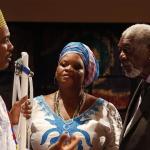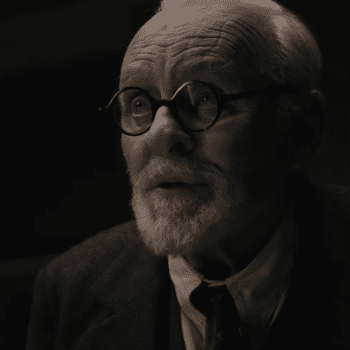
The film follows Father Sebastião Rodrigues (Garfield) and his fellow Jesuit, Francisco Garrpe (Driver), in 17th century Japan, a land utterly foreign and, to Christians, obscenely dangerous.
Yet they feel compelled to go. Yes, to minister to the Christians living in hiding there, but also to find what became of their beloved teacher, Father Ferriera {Liam Neeson), rumored to have denied his faith under torture.
So they go. And at first, their experience is pretty wonderful. They’re led to a town filled with Christians who’ve clung to their faith in spite of the danger who joyfully welcome the priests as if they were Christ himself. And for a time, all is well. God’s here. He’s in charge. And these seeds He’s planted here have found good soil. Rodrigues, in his notes back to Portugal, rejoices.
To this point, the story feels almost like a Christian cliché, God and faith at work in one of the world’s darkest recesses. Many of us have heard stories a little like this from modern-day missionaries or soup-kitchen volunteers.
But then Japan’s restrictive power structure, headed by the as-yet-unseen Inquisitor Inoue, begins to make its presence felt. The village is raided by the authorities, tempting villagers with promises of wealth and safety if they turn over the priests they suspect are hiding there. And if no information is forthcoming … well, they’ll take hostages—sacrifices, really—in their stead.
The villagers decide amongst themselves who will serve as a hostage, knowing that it’ll likely mean their death. And indeed, when three of the four refuse to spit on an image of the Virgin Mary, they’re sacrificed: Tied to crucifixes staked on the shore, they’re battered by the incoming tide for days, until the power of the waves and pain of exposure kills them off, one by one. One, Mokichi, sings a hymn, bravely, as the waves crash into his chest.
In Shūsaku Endō’s book Silence, the template for Scorsese’s film, Rodrigues writes a letter back home about these extended, torturous executions:
I know what you will say: ‘Their death was not meaningless. It was a stone in which in time will be the foundation of the Church; and the Lord never gives us a trial which we cannot overcome. Mokichi and Ichizo are with the Lord. Like the numerous Japanese martyrs who have gone before, they now enjoy everlasting happiness.’ I also, of course, am convinced of all of this. And yet, why does this feeling of grief remain in my heart? Why does the song of the exhausted Mokichi, bound to the stake, gnaw constantly at my heart:
We’re on our way, we’re on our way,
We’re on our way to the temple of Paradise …













